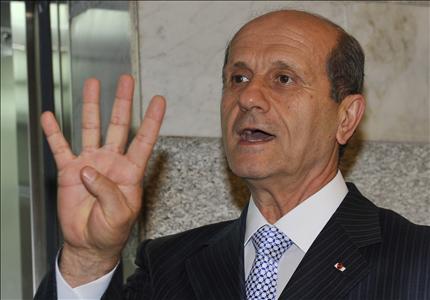
Proportionality Electoral Law: Governmental Achievement Facing Deadly Challanges

Hussein Assi
NEW LAW..
MORE THAN ACHIEVEMENT..
LAWMAKERS TO ASSUME HISTORIC RESPONSIBILITY...
WHAT IF LAW WAS REJECTED?
ELECTIONS THREATENED...
Finally, the Lebanese government fulfilled its promises and admitted the long-awaited electoral law, based on proportional representation...
The "achievement" is major. It is the first of its kind in Lebanon, after decades of implementing a laws based on simple majority representation, what gives some prominent political sides their right to be represented.
However, the government's "verdict" does not end the story. The real "challenge" will take place at the Parliament, where the real positions of the various blocs will be covered.
That's it. For the first-time ever, the Lebanese government adopted an electoral law based on proportional representation, in harmony with laws approved in most democratic countries.
The law calls for dividing Lebanon into 13 electoral districts for the 2013 parliamentary elections, therefore cutting the number of districts to almost half of what the current election law stipulates. According the draft law, there are two electoral districts in Beirut, two in the South, three in the Beqaa, three in the North and three in Mount Lebanon.
Aside from the introduction of proportional representation, the draft electoral law includes several key reforms, including a quota for female participation and the creation of an independent body to oversee elections.
The Progressive Socialist Party was the only ministerial bloc that had rejected proportional representation. Its leader MP Walid Jumblatt has repeatedly voiced his objection to the adoption of proportional representation for the electoral law and argued that enacting such a system is aimed at curbing his political influence. "I don't want any type of proportionality and that's all," Jumblatt was recently quoted as saying.
For the pro-reform activists, the approval of an electoral law based on proportionality is an achievement. For them, proportionality is the "perfect" model which guarantees fair and just representation. Indeed, proportional representation means that districts can no longer be won by a single list of candidates as easily. 
Elections under proportional representation would allocate seats to lists based on the percentage of total votes they receive. If it wins 51 percent of the vote, a 10-member electoral list, for example, would receive five or six of the seats in its district, depending on the number of voters there.
In past elections, if a list's candidates received 50 percent or more of the vote, all of the candidates got elected to parliament; regardless of the fact that another list also received a significant number of votes. Under a proportionality law, this is not the case anymore. Indeed, if a district with 10 seats had two lists that split the vote 60:40, one list would send six candidates to parliament while the other would send four.
According to Interior Minister Marwan Charbel, the cabinet decision to approve the draft electoral law he has previously submitted was the right decision. "It is the first-time ever such a draft law is transferred to the Parliament," he said in an interview with Al-Intiqad last week.
Charbel's "satisfaction" is not strange. Other ministers, affiliated with most majority blocs, feel the same. For them, the challenge is major and the lawmakers will have to assume a historic responsibility in this regard. "The draft law, approved by the government, is without possible the best possible one," State Minister Salim Karam, who's also member of MP Sleiman Franjieh's Free United Lebanon's parliamentary bloc, told moqawama.org. While explaining that it was impossible for any law to be accepted by absolutely everyone in the country, he said that proportional representation has proved to be the best model so far. He warned against rejecting the law, saying that such a scenario might lead to the return to the 1960 law.
Despite everything, there are fears the "modern" law would lose the battle at the parliament, and another law, elaborated ahead of the civil war in 1960, would triumph.

This system is a winner-takes-all system. It adopts the "qada" [a Lebanese name for electoral units smaller than districts] as an electoral district. Under it, minorities have been able to determine the final outcome of the elections because the size of the district is relatively small. Critics to this system argue that candidates are elected to parliament if they belong to a list that gains the majority of votes. This means there is potential for candidates to be elected who are not preferred by the majority of voters.
Yet, the proportionality is harshly rejected by many blocs, including the PSP and the Future Movement. Former PM Saad Hariri, who rejects the proportionality as long as weapons are in the hands of the Resistance in a suspicious and strange link, said it loudly last week. He expressed belief the draft law was directed against the majority of Lebanese and vowed to block its endorsement in Parliament. His Christian "allies" did not take a firm stance, although they have always claimed they favor a proportional system.
In his interview with moqawama.org, Minister Salim Karam undermined all these objections. "Let them provide us with the substitute," he highlighted. "It is not enough to say that the law is unacceptable and to vow to topple it. They should present something better," he went on to say.
Commenting on reports claiming that the so-called "opposition" was preparing another draft law, Karam wondered whether such law would be really for the nation's interest. "Who said that the majority will accept their proposal? Who said that they are not drafting it according to their own interests?" he asked.
For Minister Salim Karam, the electoral law is not the biggest issue. Before taking any decision in this regard, one should know if the elections will take place. That's it. Karam told moqawama.org that the electoral process itself is threatened. When asked to clarify, he only speaks of the general atmosphere. "With all the chaos taking place here and there, I don't feel we are heading towards elections"...
Source: moqawama.org



